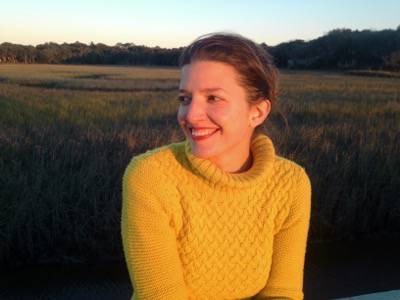
Stephanie Ellis Schlaifer
Poetry
Originally from Atlanta, Georgia, Stephanie Ellis Schlaifer is a poet and installation artist in St. Louis. She has an MFA in poetry from the Iowa Writers’ Workshop, and her poems have appeared in AGNI, Denver Quarterly, LIT, Colorado Review, Fence, and elsewhere. Schlaifer was a semi-finalist for the 2015 Discovery/Boston Review Prize, and she was selected for Best New Poets 2015. Her first book, Cleavemark, is forthcoming from BOAAT Press in 2016. She frequently collaborates with other artists, most recently with Jeff Pike on the illustrated chapbook of poems, Strangers with a Lifeboat, and with Cheryl Wassenaar on the installation Cleavemark Drive. Schlaifer is a compulsive baker and is also very handy with a pitchfork.
Schlaifer’s work can be viewed at criticalbonnet.com
Piedmont
There are grave doubts
about the hugeness of the land.
—Henry Adams
From the Cumberland Plateau to the coastal plain,
the forest seems nothing but pines—
loblolly, longleaf, shortleaf, and slash,
nothing but overstory.
Silhouetted, tall clear trunks,
high-branched, rough-barked, and heavy-boughed—
everything at right angles.
No dogwoods or redbuds heralding beneath
as a portent in anaphora. And the comfort is in
the uprightness of the vegetation.
But the land half-cleared in Ringgold stands as proof
some things cannot be stopped by mountains,
and the stand becomes a cemetery in stumps and needles.
That the tornado would not hit has showed itself: a myth.
That the Confederate army would afterward prevail, mercifully untrue.
I cannot see the mountain without the breach,
but I cannot cede the mountain either.
The mountain foot leaves everything oblique,
and I am oblique to the land
that I can't live without.
A bright sky intensifies the color of the soil,
which isolates the red from iron,
where once the sea came in and out and in and vanished
as the fall line, as Lookout Mountain,
as Chickamauga, as something screaming.
“ I’ve written a number of poems about weather and the South, but I actually started this piece in place—on one of my many road trips from St. Louis to Atlanta, where I was born and raised. I knew there’d been a tornado somewhere around Ringgold, Georgia, but it was arresting to come upon it suddenly—an area of usually dense pine forest so obliterated by the storm. It was confrontational. It’s easy to pass through towns dotted with historical markers and not think about them. Really easy. There’s one signpost in the area that shows the distance to the Chickamauga Battlefield and the local Chick-fil-A. This concurrence happens everywhere in America, of course, but this particular region is particularly rife with grief. Chickamauga is the phonetic spelling of the Tsikamagi Cherokees—the land’s original inhabitants—who were forced out and decimated on the Trail of Tears. The Battle of Chickamauga was one of the bloodiest in the Civil War, and the Confederate victory there temporarily bolstered the Southern effort. Finally, the piedmont is the geological point where the land and sea once met. It creates distinct zones of topography, soil, and vegetation, and greatly influenced human development of the land. What we have done and do to each other within this exquisite landscape is a source of great tragedy and shame. ”
